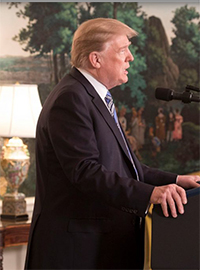| Trump, the Phone Call and Consciousness of Guilt |
 |
|
By Byron York
Wednesday, November 06 2019 |
The July 25 call between President Trump and Ukrainian President Vlodomyr Zelensky is the central piece of evidence in the Democratic drive to remove the president from office. "That call was a smoking gun," Speaker Nancy Pelosi said after House Democrats voted to formalize their impeachment inquiry. Trump has repeatedly said the call was "perfect," or, as he described it recently, "perfecto." His defenders, or most of them, have declined to adopt that characterization. But importantly, the president, and others as well, have also pointed to the circumstances of the Trump-Zelensky conversation as evidence that Trump had no intent to commit any sort of offense, and certainly not one that the House would later deem impeachable. "It's common sense," the president said recently in an expansive Oval Office conversation after the House vote. "I've got 20 to 25 people on the phone call. I've got stenographers and all of these people on the telephone. Am I going to make a statement that's illegal or bad? I'm an intelligent person. Who would do a thing like that?" To that end, Trump has urged everyone to "read the transcript" of the call. That is a reference to the memorandum, which reads like a rough transcript, prepared by the National Security Council. On the morning of the House vote, Trump tweeted, simply, "READ THE TRANSCRIPT!" In his Oval Office conversation, he said his campaign has had T-shirts made with the same message. Then, Trump said: "At some point, I'm going to sit down, perhaps as a fireside chat on live television, and I will read the transcript of the call, because people have to hear it. When you read it, it's a straight call." And, of course, the only reason everyone knows what is in the rough transcript is that, once it became the center of controversy, Trump released it to the public. He did so over the objections of some officials who argued disclosure would be an unprecedented breach of the confidentiality of the president's communications with other heads of state. In short, Trump appears to be making no effort to conceal what he said to Zelensky, be it about his belief that other countries should bear more of the burden of foreign aid or what he wanted Ukraine to investigate about the 2016 election and about former Vice President Joe Biden and son Hunter Biden. So what to make of a situation in which one side says the call is a smoking gun, while the other screams, "READ THE TRANSCRIPT"? "Look at the circumstantial evidence surrounding this," former independent counsel Kenneth Starr said in a recent interview. "[Did Trump say] 'Bring him in, bring him in here, and I want to talk to him privately'?" No. Instead, Starr explained, Trump chose a phone call, rather than a one-on-one meeting, to make his points with Zelensky. Remember when the president was accused of being secretive in a one-on-one conversation with Vladimir Putin with no one other than translators within earshot? This wasn't that. There were 17 people on the phone, including the secretary of State," Starr continued. "The president was so, shall I say, open and transparent about it that that goes to his intent. There's no corrupt bargain, or an attempt to achieve a corrupt bargain, as I see it." No, no, no, say Democrats. Trump's behavior, according to presidential candidate Sen. Kamala Harris, showed "clear evidence of consciousness of guilt." The call is not a "straight call," as the president said. It's a confession of a crime. Part of the problem with that position is that Democrats have had a difficult time coming up with a law that Trump violated in the Zelensky call. Some have said it was extortion. Some have said it was a campaign finance violation. Some recent speculation has focused on an obscure statute called the Hobbs Act. But nobody has made a slam-dunk case that Trump broke the law. Still, Democrats say, the White House move to restrict access to the rough transcript shows an awareness that something was amiss. "People involved in the preparation of this transcript had, in effect, a consciousness of guilt," CNN's Jeffrey Toobin said recently. The problem with that argument, in the context of impeachment, is that it refers to White House staff, not to the president himself. Some of Trump's most determined adversaries say his "read the transcript" mantra is the work of a sociopath, of someone who is incapable of knowing right from wrong, or perhaps it is an in-your-face defense strategy that comes naturally to a man who almost never admits a mistake. But the simplest explanation is that Trump really doesn't believe he did anything wrong. "Everybody knows I did absolutely nothing wrong," the president said in the Oval Office before ticking down impeachments past. "Bill Clinton did things wrong. Richard Nixon did things wrong ... I did nothing wrong, and for [Democrats] to do this is a disgrace." In recent days, both sides in the impeachment debate appear to be hardening their positions. House Democrats are dead-set on impeaching Trump, and Republicans seem more and more determined to resist. In the Senate, Republicans appear to be moving toward arguing not that the Trump-Zelensky call was "perfecto," but that it was inappropriate and yet still does not rise to the level of an impeachable offense. The president has a counter to that argument, too, which he put in a recent tweet. His advice: Read the transcript. Byron York is chief political correspondent for The Washington Examiner. |
Related Articles : |
























